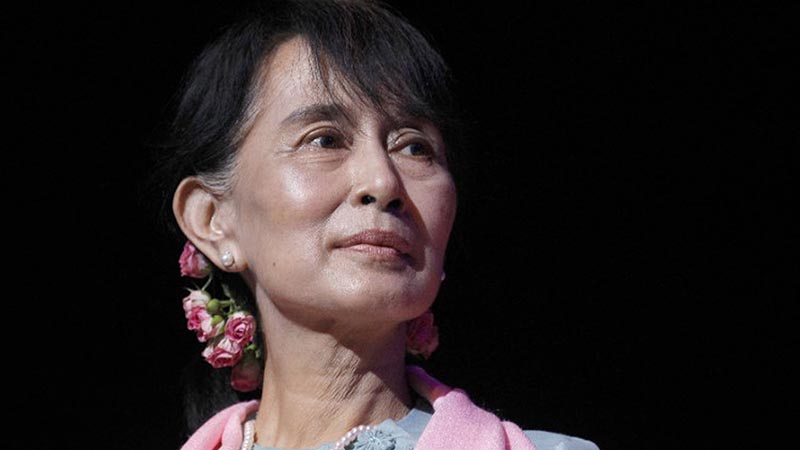Suu Kyi in Hague to face genocide charges

In a bid to defend the country against charges of genocide of its Rohingya Muslim minority, Myanmar leader Aung San Suu Kyi is on the way to The Hague, the UN’s top court. Suu Kyi is facing trial in the international court and it would be difficult for her to defend her country, said observers.
A momentous legal confrontation will take place at the UN’s highest court this week when the Nobel peace prize winner appears before the court, report Reuters, AFP and The Guardian. Demonstrations are planned throughout the coming week, with hearings set for Dec. 10 to 12, and several dozen supporters are also bound for The Hague, in the Netherlands, to cheer Suu Kyi on.
The international criminal court (ICC), elsewhere in The Hague, has launched a separate investigation into alleged crimes against humanity committed by Myanmar’s leaders in forcibly deporting hundreds of thousands of Rohingya refugees to neighbouring Bangladesh.
The west African state of Gambia, acting on behalf of the 57-nation Organisation of Islamic Cooperation, will ask the International Court of Justice to take emergency measures to halt Myanmar's "ongoing genocidal actions". Once internationally feted as a human rights champion, Myanmar’s state counsellor is scheduled to lead a delegation to the international court of justice (ICJ) in The Hague.
The claim that Myanmar’s military carried out mass murder, rape and destruction of Rohingya Muslim communities has been brought by the Gambia, a West African state that belongs to the Organisation of Islamic Cooperation. Security around the court is expected to be tight. There has been speculation that undisclosed arrest warrants may have been issued in relation to other legal proceedings against Myanmar.
Under the rules of the ICJ, member states can bring actions against fellow member states over disputes alleging breaches of international law – in this case, the 1948 convention on the prevention and punishment of the crime of genocide. It is not the first time the tribunal, also known as the world court, has considered genocide cases – it dealt with several from the Balkan wars of the 1990s – but it is the first case involving countries that are not neighbours.
The three-day hearing in the neo-Renaissance-style Peace Palace is what is known as a provisional measures procedure. The Gambia will urge the court to make an emergency declaration that Myanmar must halt a continuing genocide, and the court will consider whether it has jurisdiction and whether there is a plausible case to answer.
This preliminary phase of the claim will not involve personal testimony from any of the estimated 700,000 Rohingya who fled to Bangladesh after the start of what are alleged to have been military clearance operations. The Gambia’s submission states: “The genocidal acts committed during these operations were intended to destroy the Rohingya as a group, in whole or in part, by the use of mass murder, rape and other forms of sexual violence, as well as the systematic destruction by fire of their villages, often with inhabitants locked inside burning houses.”
Its arguments rely on the findings of UN investigations that described “genocidal intent” in the crimes. The UN special rapporteur Yanghee Lee related first-hand accounts of “attacks in which homes were set ablaze by security forces, in many cases with people trapped inside, and entire villages razed to the ground”.
The Gambia’s case will be opened on Tuesday by Abubacarr Marie Tambadou, the country’s attorney general and justice minister, who studied law at Warwick University in England and later served with distinction as a special assistant to the prosecutor at the international criminal tribunal for Rwanda.
The hearing, which will be livestreamed, may attract a large international audience. It will be tempting for the Gambia’s lawyers, distracted by Aung San Suu Kyi’s presence, to personalise the accusations, but the focus will remain on the Rohingya victims.
In the run-up to the hearing, members of Aung San Suu Kyi’s National League for Democracy party held rallies in Myanmar’s largest city, Yangon. Among the country’s Buddhist majority, she retains overwhelming support. “I believe in Mother Suu and love her,” said Tin Aung Thein, the organizer of a group tour, told Reuters at the airport in Yangon. “I want (the world) to know the truth. The country has suffered a lot because of fake news.”
Despite international condemnation over the campaign, Suu Kyi, whose government has defended the campaign as a legitimate response to attacks by Rohingya militants, remains overwhelmingly popular at home. “I believe in Mother Suu forever,” said Zaw Htet, a former political prisoner who joined the trip to The Hague.




